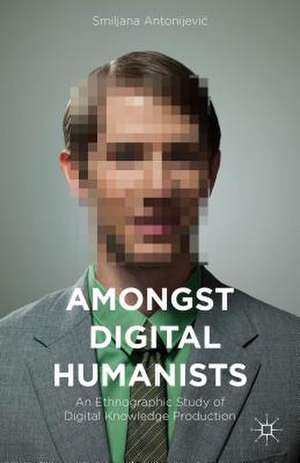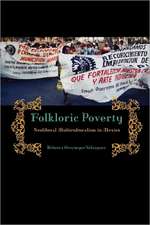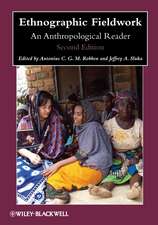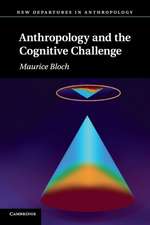Amongst Digital Humanists: An Ethnographic Study of Digital Knowledge Production
Autor Smiljana Antonijevićen Limba Engleză Hardback – 30 sep 2015
| Toate formatele și edițiile | Preț | Express |
|---|---|---|
| Paperback (1) | 381.00 lei 43-57 zile | |
| Palgrave Macmillan US – 10 feb 2016 | 381.00 lei 43-57 zile | |
| Hardback (1) | 387.20 lei 43-57 zile | |
| Palgrave Macmillan US – 30 sep 2015 | 387.20 lei 43-57 zile |
Preț: 387.20 lei
Nou
Puncte Express: 581
Preț estimativ în valută:
74.10€ • 77.08$ • 61.17£
74.10€ • 77.08$ • 61.17£
Carte tipărită la comandă
Livrare economică 14-28 aprilie
Preluare comenzi: 021 569.72.76
Specificații
ISBN-13: 9781137484178
ISBN-10: 1137484179
Pagini: 196
Ilustrații: XII, 196 p.
Dimensiuni: 140 x 216 x 13 mm
Greutate: 0.4 kg
Ediția:1st ed. 2015
Editura: Palgrave Macmillan US
Colecția Palgrave Macmillan
Locul publicării:New York, United States
ISBN-10: 1137484179
Pagini: 196
Ilustrații: XII, 196 p.
Dimensiuni: 140 x 216 x 13 mm
Greutate: 0.4 kg
Ediția:1st ed. 2015
Editura: Palgrave Macmillan US
Colecția Palgrave Macmillan
Locul publicării:New York, United States
Cuprins
.Introduction.-.Chapter 1: Digital Humanities as Theory and Practice.-.Chapter 2: Workflows of Digital Scholars.-.Chapter 3: Disciplinary (Re)Orientations.-.Chapter 4: Organizational Patterns.-.Chapter 5: Beyond Expectations.
Recenzii
"At last, a thorough field study that does not approach the digital humanities as a sole entity, but puts the practices of humanities researchers central. This comprehensive, multifaceted ethnography of the expectations, successes, but also failures of all sorts of actors using digital methods in humanities research should not only be read by (digital) humanists or collaborating computer scientists. Policy makers of universities and funding organizations could also benefit from this empirical exploration of how digital humanists work in practice." - Charles van den Heuvel, Chair, Digital Methods and Historical Disciplines, University of Amsterdam, The Netherlands
"Finally someone is paying attention to what people are really doing when they say they are doing digital humanities. Antonijevi? brings empirical depth and analytic clarity to a field often characterized either by overblown claims of radical transformation or deep skepticism about the possibilities of digital technologies. This book is essential reading for those engaged with digital humanities - as researchers, hardware and software developers, university administrators, librarians and archivists, and funders." - Sally Wyatt, Programme Leader, eHumanities Group, Royal Netherlands Academy of Arts and Sciences
"This ethnography of 258 digital humanities practitioners - seen as individual scholars doing 'boundary work,' and as participants in disciplinary and organizational evolution - moves us decisively beyond the 'who's in/who's out' misunderstandings of the past several years. Antonijevi?'s insightful study demonstrates that, when it comes to new modes of knowledge production in the humanities, we're all in." - Bethany Nowviskie, Research Associate, Professor, Digital Humanities, University of Virginia, USA
"This thorough and far-reaching study of academic research practices fills an important gap in debates about the Digital Humanities. Using extensive ethnographic research attwenty-three institutions in Europe and the US, Antonijevi? provides engaging analysis of digitally mediated knowledge practices in the humanities from three perspectives: individual scholar, discipline, and institution. An invaluable contribution to research into the changing roles and habits of the (increasingly digital) Humanist." - Paul Spence, King's College London, UK
"Finally someone is paying attention to what people are really doing when they say they are doing digital humanities. Antonijevi? brings empirical depth and analytic clarity to a field often characterized either by overblown claims of radical transformation or deep skepticism about the possibilities of digital technologies. This book is essential reading for those engaged with digital humanities - as researchers, hardware and software developers, university administrators, librarians and archivists, and funders." - Sally Wyatt, Programme Leader, eHumanities Group, Royal Netherlands Academy of Arts and Sciences
"This ethnography of 258 digital humanities practitioners - seen as individual scholars doing 'boundary work,' and as participants in disciplinary and organizational evolution - moves us decisively beyond the 'who's in/who's out' misunderstandings of the past several years. Antonijevi?'s insightful study demonstrates that, when it comes to new modes of knowledge production in the humanities, we're all in." - Bethany Nowviskie, Research Associate, Professor, Digital Humanities, University of Virginia, USA
"This thorough and far-reaching study of academic research practices fills an important gap in debates about the Digital Humanities. Using extensive ethnographic research attwenty-three institutions in Europe and the US, Antonijevi? provides engaging analysis of digitally mediated knowledge practices in the humanities from three perspectives: individual scholar, discipline, and institution. An invaluable contribution to research into the changing roles and habits of the (increasingly digital) Humanist." - Paul Spence, King's College London, UK
Notă biografică
Dr Smiljana Antonijević explores the intersection of communication, culture, and technology through research and teaching in the U.S. and Europe. Recent publications include Personal Library Curation, 2014; Working in Virtual Knowledge, 2013; Researchers' information uses in a digital world, 2012; Digital Rhetoric and Public Discourse, 2008. Smiljana co-edited Into the Blogosphere: Rhetoric, Community, and Culture of Weblogs (2004). More at www.smiljana.org.
Textul de pe ultima copertă
Amongst Digital Humanists brings an ethnographic account of the changing landscape of humanities scholarship as it affects individual scholars, academic fields and institutions, and argues for a pluralistic vision of digital knowledge production in the humanities. Based on fieldwork conducted at twenty-three academic and funding institutions in the US and Europe and on interviews with researchers, students, librarians, web developers, policy makers, and funders, this study shows how digital technologies transform the ways humanists envision, carry out, communicate, and organize their work and approach their objects of inquiry.
Caracteristici
Analyzes the transformations that are occurring in the humanities scholarship and its effects on the individuals and groups who are involved in the field Includes interviews with students, librarians, policy makers, web developers, and funders and research conducted at various insitutions in different regions Discusses what the future may hold for digital scholarship














